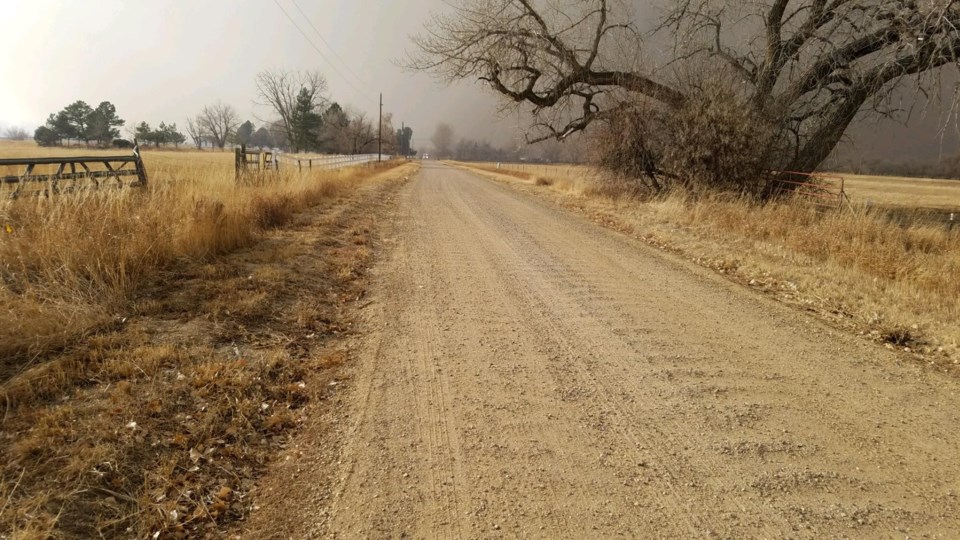Boulder County Commissioner Matt Jones agreed with most people that dangerous wildfires would only torch mountain communities or homes planted squarely on Colorado’s plains.
The December 30, 2021 Marshall fire quickly changed Jones’s perspective. At least, 2,000 structures in Louisville were either totally destroyed or impacted by flames that jumped from one building to another with abandon.
“I was totally wrong about wildfires,” Jones said. “It was just crazy to see something like that, a totally wind-driven plume that burned everything in its path.”
Jones, a former wildland firefighter and a 20-year Louisville resident, had to evacuate because of the fire. “We were lucky. We didn’t get it half as bad as others in Louisville. It just drove home how things have changed.”
Jones hopes a county-proposed sales tax measure to fund wildfire mitigation and emergency response will get approved by voters in November. The two plans will boost the county’s pace and scale of wildfire mitigation and community resilience to match the threat wildfires now pose, Jones said.
“The county’s annual public opinion survey made clear that concerns about wildfire mitigation and emergency response are top priorities for Boulder County residents,” Jones said via a news release.
Public hearings will be held Thursday at 10:30 a.m. for a proposed extension of the county’s transportation tax and 3 p.m. Thursday for emergency response and wildfire mitigation.
The county is proposing a 0.1% sales tax for wildfire mitigation and a 0.1% sales tax for emergency response. The emergency response tax would decline to 0.05% after five years, Jones said, adding a 0.1% sales tax is a penny on $10.
The county’s transportation sales tax was first passed in 2001 and extended in 2007. To date, the transportation sales tax revenue since 2001 is $94.7 million, Gloria Handyside, spokeswoman for the Boulder County Commissioners said via email.
The estimated forecast of combined revenue generation (sales and use) for all three proposed ballot measures is $33M for 2023, Handyside said.
Mountain residents are especially adamant more needs to be done to head off the threat of wildfires, Boulder County Commission Vice-Chair Claire Levy said in the news release.
“Mountain residents have been through numerous wildfires in recent years and I continue to meet regularly with residents who lost a home during the Marshall fire,” Levy said. “We are hearing from residents that this is top of mind.”
Sheriff Joe Pelle said in the news release the emergency response and fire mitigation ballot measures would help fund emergency services like search and rescue, ambulance service, and wildfire response in the mountain and rural areas of Boulder County. The measure would also provide a funding stream for the needed improvements, Pelle said.
Rocky Mountain Rescue, an all-volunteer agency, annually performs over 200 search and rescue calls in the mountains of Boulder County, Pelle said. But the agency is badly in need of improved facilities to house equipment and vehicles to provide meeting and training space.
“These funds would be used to build and provide that facility as well as other future capitol and equipment needs,” Pelle said. “Providing funding for on-going landscape level fire mitigation is also crucial to the future of fire safety in our county.”
The county’s recent public opinion survey found solid support for extending the existing transportation sales tax, which has funded 44 significant multimodal transportation projects since 2009, Levy said. “This revenue is essential for safe, sustainable, affordable, and inclusive transportation connections throughout Boulder County,” Levy said.
Draft ballot language for the proposed measures is available on the county website. The public hearings are scheduled for 10:30 a.m. on Thursday, August 4 (for transportation) and 3 p.m. on Thursday, August 4 (for emergency response and wildfire mitigation). Members of the public can register to comment at the August 4 public hearings or submit comments online in advance of the meeting:
- Register to attend and/or comment at the August 4, 10:30 a.m. Transportation Ballot Measure Public Hearing. This meeting will be held virtually.
- Register to attend and/or comment at the August 4, 3 p.m. Wildfire Mitigation and Emergency Response Ballot Measures Public Hearing. This meeting will be held virtually.
- Submit a written comment ahead of the August 4 public hearings.



